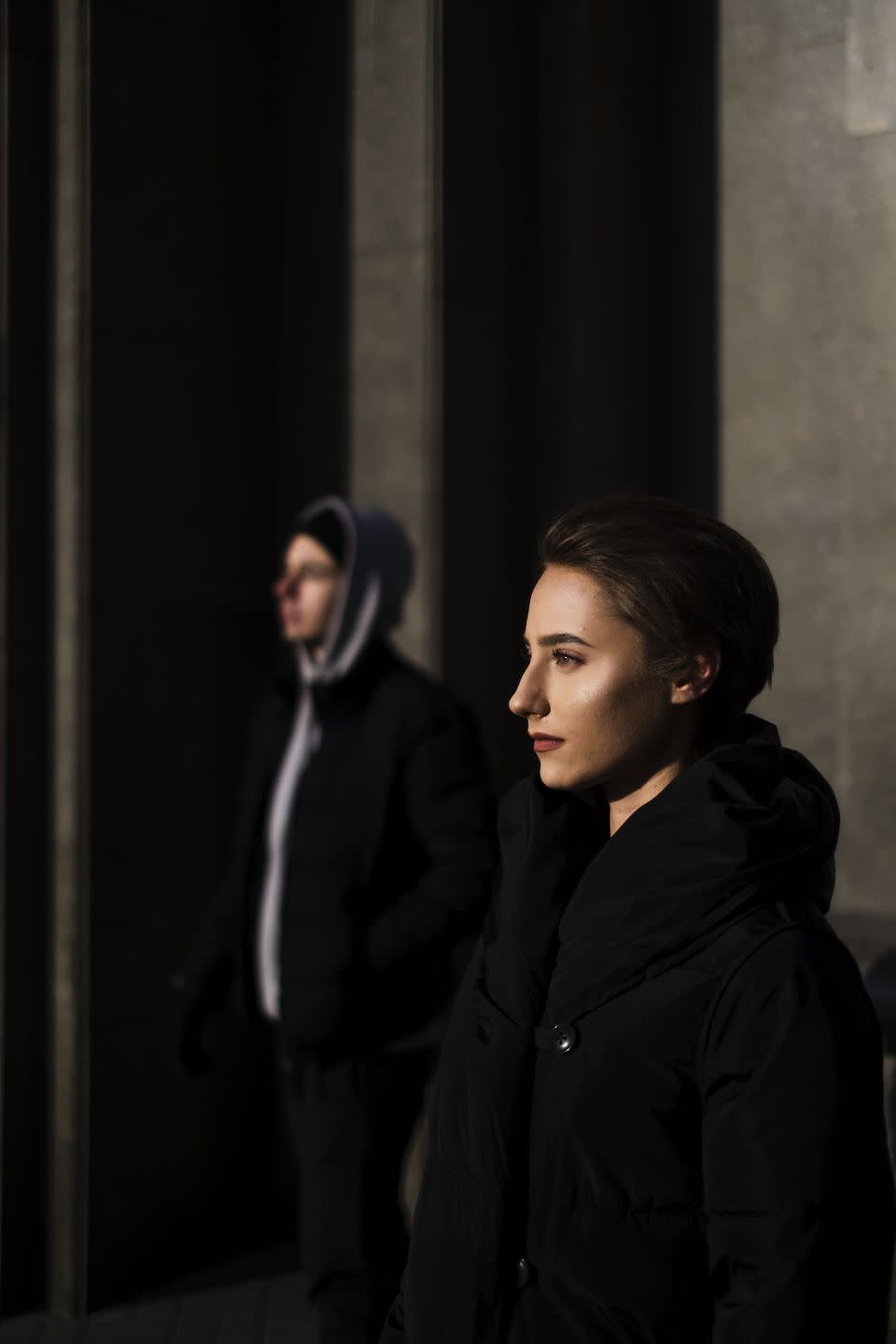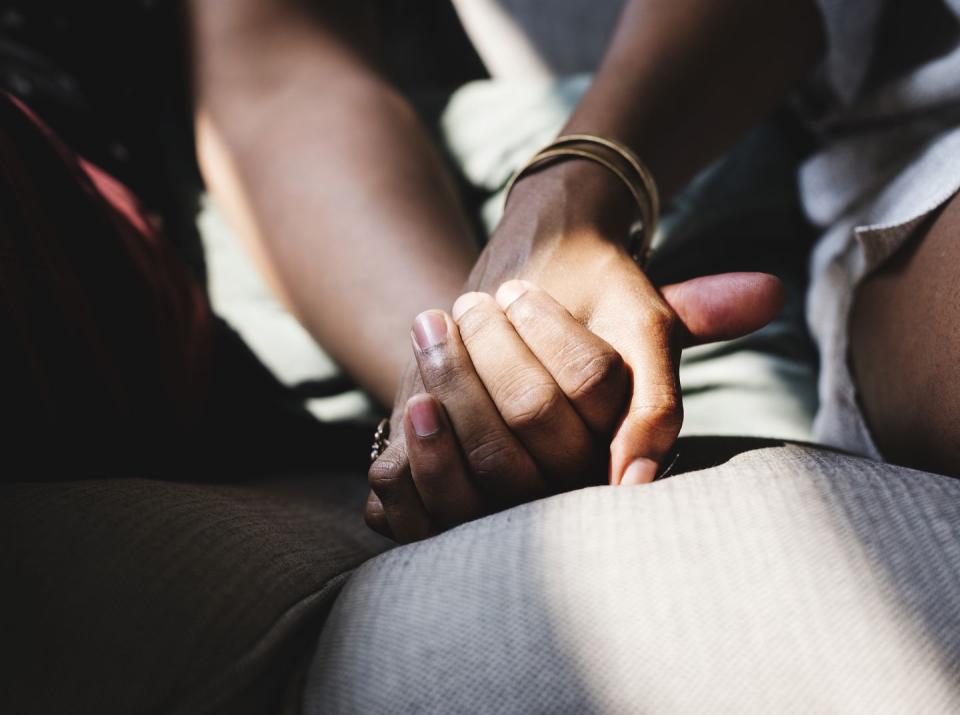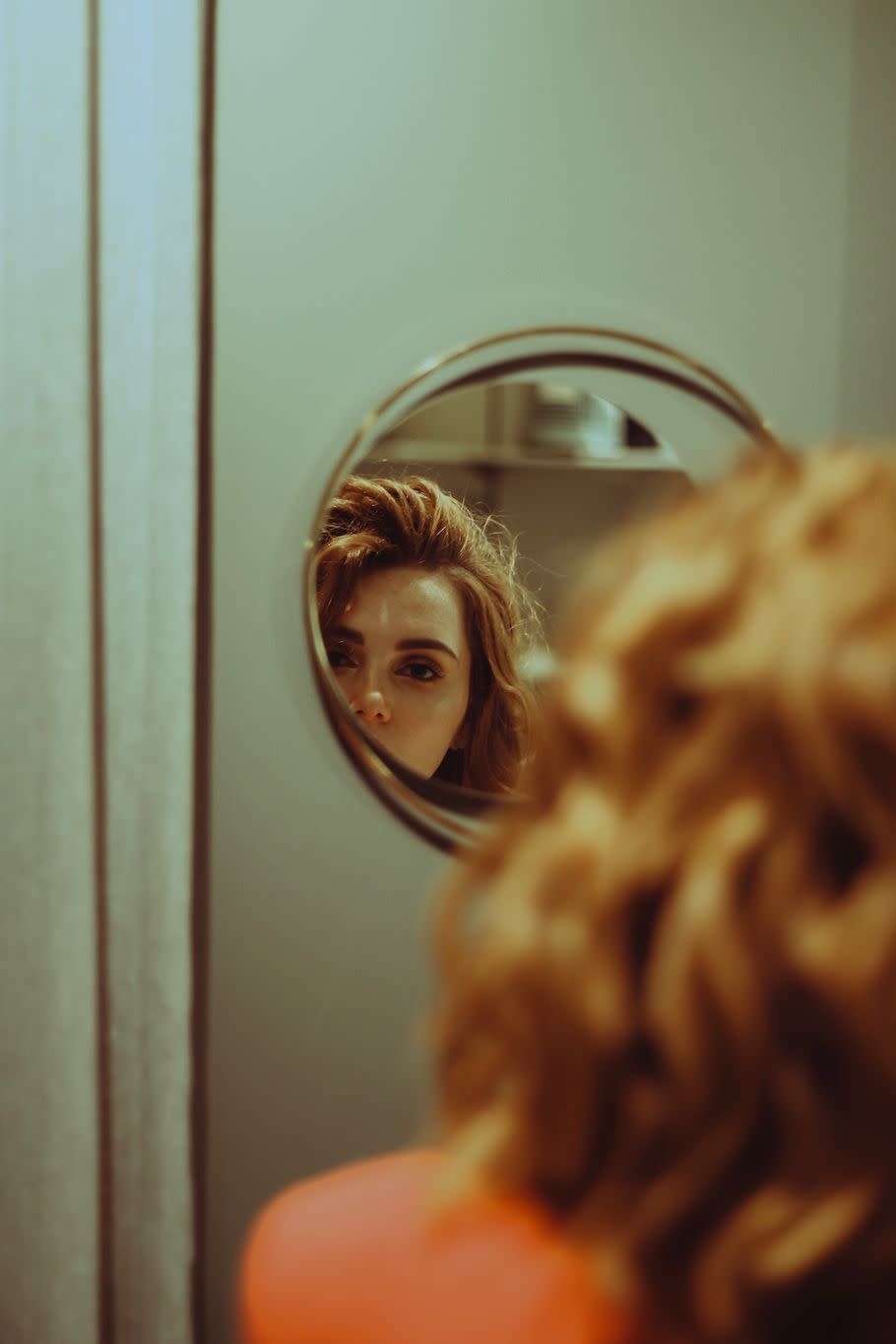Four Women Explain What It's Like To Get Closure On Life’s Biggest ‘What Ifs’

Finding closure on... heartbreak

by Abigail Bergstrom
‘I don't have to tell you that.’ He’d called me when I was on a work trip in New York and ended things over the phone. I don’t remember all the details of the call, sat on the 10th floor in my hotel room on the Lower East Side, I just remember he said those words confidently. In fact, the only thing he’d been clear about – on the subject of us breaking up – was that he didn’t have to tell me why. I asked him if he’d planned to break up with me before dialling.
‘No,’ he’d replied in his thick Dublin accent. ‘I’d not.’
His actions were laughable in their unbelievability. It was surely a joke. Or was it a moment of insanity? The night before my flight, we’d had dinner in one of our favourite restaurants. He’d ordered champagne to toast our future: ‘It’s just you and me now and it’s all uphill from here.’
But he was sure it was over. As soon as the call ended, I texted my three closest friends, who jumped onto bikes and into cabs to meet me at a dive bar. There, I broke down. We drank enough tequila to drown my sorrows, until the next day they resurfaced and felt even more unbearable.
He and I had been in the same friendship group at university but lost touch, reuniting years later at a party I’d thrown for friends who were emigrating. The connection had been instant, which struck us as strange because this instinct hadn’t been there before. That night he asked me on a date; I said yes. And then I fell in love with him in the way the sun sets: slowly, gradually, as if it might not even happen, then, in the overwhelming glare of bright hues, suddenly all at once.

He was a man characterised by his kindness. A good, well-intentioned soul. The sort that seemed the least likely on the planet to hurt me; that had been the basis on which I’d gone to him. But then he did hurt me, and in a way I couldn’t have foreseen.
I don’t have to tell you that.
A broken heart always feels unique, even though it’s something most of us will experience. It’s strange how something so universal can make us feel so isolated. In the weeks that followed, I couldn’t eat, sleep or think straight. That summer I skipped Glastonbury (the only year I’d managed to get tickets). I went to Devon with my parents instead and sat on the coast reading A Little Life, grieving. I read about someone else’s torture in a bid to escape my own.
Trying to find closure felt like a never-ending hangover that led to bitterness, anger and despair. I was determined to make myself better, though, and did what I always do when my personal life is in pain: I threw myself into work, setting up a successful literary agency. But, put plainly, I was just really sad for a long time. It led me to second guess everything. I no longer trusted myself. I could no longer rely on myself to determine my reality when I had got it so wrong. I felt delusional, humiliated for ever thinking it might work. Around and around in my head it went, this question, in all its forms: Why?
I can’t pinpoint the moment it all changed. Falling out of love with him happened much in the same way that I fell for him: gradually, as if it might not even happen, then suddenly, all at once. I rebuilt myself, brick by brick, and one day I realised I was happy. Heartbreak was my conduit to independence and peace. I stopped waiting for another person to bring completion and did it myself: I built a business, moved into my own place, got a dog, started writing and actively partook in creating the life I wanted.
This heartbreak was both the worst and best thing. It got me so lost that nothing could ever feel better than the victory of finding myself again. I had no way of knowing why he ended it, but closure came in the realisation that I didn’t need to. This information wasn’t mine to have.

Does the other person owe us closure when it’s over? I don’t know that they do. Sometimes we have to put ourselves first – no questions answered. That can make our actions appear cruel outwardly, but it can be the biggest act of kindness towards ourselves. He wasn’t obligated to explain his pain to me. The power to let him go was mine all along. I thought I needed an explanation from him but, in the end, I just needed one from myself.
I’ve now fallen in love again and am at the beginning of a new relationship. I’ve gone into it knowing that, no matter how much love there is, devastation could be the consequence and this other person isn’t responsible for resolving that for me – I am.
I found closure in being courageous enough to believe my own version of the truth, no questions asked. As it turns out, the sudden ending of my last relationship didn’t take away from its significance. And, if he called me tomorrow and offered a full explanation for his actions, I’d smile down the phone and with all the warmth in my heart say, ‘No, it’s OK. You don’t have to tell me that.’
Finding closure on... self acceptance

by Anneli Rufus
Praise me. Pay me a big, fat, juicy compliment. Tell me I look fantastic. I won’t believe you. I will laugh or scoff or suspect you of mocking me or playing some trick, because no way could it be true.
I’ve felt this way for as long as I can remember: always thought myself inferior, incompetent, unlovable, my welcomes worn out before they began. For years, I woke daily imagining a boxing-gloved fist punching me repeatedly — deservedly, I thought — for past, present and future wrongs. So, you ask, how many houses have I burgled? How many ponds have I poisoned, how many sweet owlets have I harmed? Zero, zilch, zip.
Low self-esteem is seldom rooted in reality, but we, its prisoners, tiptoe through life believing with our every atom that it is. So deeply is it coded in us that we cannot recognise self-hatred as a world view – much less a malady, a curse, a violent crime. We cringe when saying first-person singular pronouns: I, me, mine. Step on our feet, spill coffee on our coats and we apologise.
Maybe it’s in my DNA. From birth onwards, I watched my smart, stylish, statuesque mother glaring into mirrors, pinching herself savagely while hissing at her own reflection: ‘Chubster. Fatty. Pig.’ I took this as instruction. Young brains learn relentlessly, obtaining and absorbing data rapid-fire from everything they see, feel, hear. So how could my tiny, voracious mind not memorise that self-skewering gaze, those spade-in-gravel growls?

She never hid these scenes from me or said, ‘Sweet precious princess, this is my problem, not yours.’ Perhaps she could not help but shout at me, because those who hate themselves mistrust whatever they make. Having been raised by someone who habitually measured the distance between my waistbands and actual waist — and still asked, during phone calls, ‘How’s your weight?’ — I ate almost nothing but apples and energy bars and hid myself in clownishly huge clothes that billowed sail-like in the wind. To avoid cursing into mirrors, as my mother did, I shunned reflective surfaces, even while getting dressed.
Totally mystified by having found a boyfriend, I countered his claims that I was sweet and pretty and hilarious with accusations: ‘You’re clearly lying. Or joking. What I cannot understand is why.’
I was offered a perfect job, which entailed foreign travel and high-profile interviews. I declined it because others ‘deserved it more’, and because horror-filmic scenes of my own grotesque future blunders hurtled through my brain.
Having low self-esteem doesn’t feel like having a problem. It feels like being a problem. It means living like anyone else, except nearly every word we say and thing we do sparks dread and then regret. But we seldom seek help because we think our problem is ourselves: intrinsic and unfixable. We assume that psychologists will either guffaw in our faces or tell us we can be cured if we change jobs or wardrobes, socialise, learn languages, lose weight.
Sometimes we try. But when such shifts and conquests occur atop and around the unprocessed trauma and training that typically spawn our low self-esteem, we simply become these slim, sociable astronauts who wear silk-twill and speak Dutch and still cannot stand ourselves. That was more or less me, with slightly altered adjectives. All of my accomplishments felt accidental, like mistakes or tricks.
Then my friend killed herself.

The day we met, at university, we talked for hours. ‘This never happens,’ she marvelled. ‘No one likes me.’ Years sped past, during which — over thousands of milky coffees — we hailed brilliance in each other but never ourselves.
After she died — it was her fourth attempt — I wondered what it would have taken to dissuade her. Not: She should have loved herself! because of course she should have. But highly demanding parents, harsh relationships, crushed dreams and illness had, for her, short-circuited that chance. The question was, instead: What could have made Lizzy hate herself less? What evidence, what proof might have persuaded her to stay?
This was the new geography. Not two sole possibilities comprising opposite extremes — self-hatred and self-love, light years apart — but a vast spectrum spanning those, along which we crawl, plod or bushwhack toward a magic midpoint: the soft, safe Land Of OK. This is our quest, our way lit with whatever aspects of ourselves we deem unhorrible: I draw nice pictures. I help strangers feel at home. Wild birds alight beside me, unafraid. I’ve never robbed or murdered anyone.
It is a small and arguably random scale, but small torches shine too. If battle makes one brave and we win a lifelong battle with the most treacherous foe – ourselves – then what are we? Closure means accepting what once was unacceptable. If that ‘something’ is us, then we must learn to accept acceptance itself.

Exhorting ‘Love yourself!’ — as if anything else signifies failure — tends to make me hate myself more. Self-Adoration City seems to me so far and unfathomable that it might as well be mythical.
And just as I will almost surely never see Mount Everest, I am unlikely to reach that distant realm whose selfie-snapping residents stride confidently in form-fitting outfits and aren’t nauseated by the sounds of their own names.
But that’s OK, as long as I can stay here safely in this quiet, boxing-gloveless glade somewhere between those two extremes. Some would declare it dull, but that’s the point.
Unworthy: How to Stop Hating Yourself by Anneli Rufus is out now
Finding closure on... a place

by Hadley Freeman
As soon as I landed in London I was plotting how quickly I could leave. My parents and I moved there from New York City when I was 11. Don’t get me wrong: I loved – and love – London. But something broke inside me the day we left New York. Maybe it was my heart, but it felt more like my brain: it just didn’t make sense; I knew it was where I belonged.
I thought of myself like Marty McFly in Back to the Future Part II, stuck in the wrong timeline. This was perhaps the first time I truly understood my powerlessness as a kid – if my parents said we were going to London, we were going to London – and from then on I blamed everything that went wrong in my life on geography, which was just a complicated way of blaming my parents. All those bad boyfriends I had as a teenager (and adult) wouldn’t have happened in New York. I bet the dating scene is amazing in New York.
After university, I got a job at The Guardian and convinced the paper to send me to New York as a correspondent. I moved into an apartment in the West Village and, that first morning, I felt like I was levitating. I had no furniture and few friends in the city, but I was happy. Every taxi horn, every park, every food product in my local supermarket took me back to my childhood: the whole city was my Proustian madeleine, and I was ecstatic. At last, I was back on the right timeline. This long-awaited happiness lasted, ooh, around two months.

Although I was still working for The Guardian, I freelanced for some US magazines. Occasionally, editors would ask me to come in for a coffee, and I’d walk into those glitzy offices, all the women click-click-clicking about in high heels, and I’d feel excited. Forget all that scruffy Britishness, I’d think, I should be working in a place where trainers are verboten, and blow dries de rigeur. I imagined myself arriving in a chauffeur-driven company car, my reputation striking fear into journalists around the world, and despite all evidence to the contrary, I’d think, That is where I should be.
There was just a small problem: I missed London. I liked the New York journalists I met, but I found their indefatigable ambition a bit hard to take, always asking where I worked, obsessed with who had a cover story on which magazine. I increasingly gravitated to Brits in New York, who may have been just as professionally competitive, but this was generally hidden beneath a more pressing desire to get drunk. Oh, and the New York dating scene? After another date with another jerk, I gave up and got a dog.
As I started to admit I wasn’t enjoying my life in New York, I had the very belated realisation that most of my feelings about the city were of the past. I hadn’t been wanting to go back to New York, I’d wanted to go back to my childhood. The time before my difficult teenage years, when I’d suffered from anorexia nervosa; before I was an adult, with all the scary responsibilities that entailed; before I kept making mistakes with boyfriends, over and over again. I wasn’t looking for America – I was looking for a do-over. And you can’t buy one of those, even in New York.
Pretty soon after I figured this out, I met someone back in London.

A few months later, I moved there to be with him. This time, I boarded my plane without any regrets. I’d done my time in New York. I happily gave up my fantasy of being the next Tina Brown, because it took me a long time to understand three pretty obvious things: 1) Home is not where you think you should be, it’s where you’re happy. 2) Everyone makes mistakes in life and that’s OK. 3) No job is worth having to wear high heels every day.
I now visit New York with my husband – the man I left there for – and our kids, and it’s fine. It’s no longer a symbol of everything that went wrong in my life, but a city: one I was lucky to be born in, and one I can leave to go home.
House of Glass by Hadley Freeman is out now
Finding closure on... others' expectations

by Hafsa Zayyan
I had a childhood that was scattered across the world. My sister and I followed our parents from country to country as they sought opportunities to build their specialities as doctors. My parents were first-generation immigrants from Nigeria – a prime example of the immigrant success story. They faced their own unique trials when settling in England at the turn of the century as a mixed South Asian/Black couple, and they had battled those difficulties with great courage. I looked up to them immensely.
But being a second-generation immigrant comes with its own challenges – ones my parents didn’t necessarily understand. They hadn’t grown up with Western temptations and didn’t expect their daughter to succumb. ‘You want to go to the cinema?’ my dad grumbled. ‘I never went to a cinema growing up.’ They were acutely aware of some of the challenges I would face: ‘You’re a Black, Muslim woman,’ they’d tell me. ‘You’ll need to work three times as hard to even be considered.’
If a family friend’s son did well at school, I’d hear about it the next day. If I came home with 99 instead of 100, there would be the uncomfortable joke: ‘Where’s the one?’ I wanted, more than anything, to make them proud.
I needed my dad to see that, despite the abundance of cinemas, the threats of sleepovers and boys, it had still been worth coming here because of the opportunities it had given us. And though my parents never actually told me I had to do well, I put immense pressure on myself to succeed.

It wasn’t just my parents. My entire family in Nigeria were expecting the children who lived in England to succeed beyond their wildest dreams. For immigrant families, the success of your children is not just a matter of pride. It’s born out of desperation – if you put your kids in a country where they may lose touch with their roots, you need something to show for it.
For immigrant children, your success is about more than you; it charts a course for your family as a whole. You’re aware that your parents will not be considered successful unless their children are. I spent my childhood in fear of what might happen if I failed. I did everything I could to prevent that from becoming a reality. I got used to seeing the look of pride on my dad’s face; I’d be bashful yet proud when he’d boast about me.
I discovered doing well was a wonderful way of assuming an identity as a mixed-race immigrant – even if I wasn’t South Asian or Black or English enough, at least I was an asset to my parents. The problem with being an asset is that it neglects who you are beyond the roster of grades and extracurricular activities. I never spent time working on any other part of me, so I never figured out who I was other than my successes.
It became a part of my identity; how I was introduced – any achievement preceded me. This isn’t uncommon in South Asian culture. I knew who people were by what they had achieved: Bilal was the one who won the national chess championship; Suraj the orthopaedic surgeon; Aisha knew the Quran by heart.
You can’t be sure of success. This lesson arrived abruptly at what I thought would be the easiest part. My legal career would be determined by a summer of internships in my second year of university. After gruelling assessments, I was offered three. The internship was really a formality: if you got a place, you ‘d almost definitely be offered a job. After a summer of interning, we just had to wait to hear back. Slowly, everyone’s job offers filtered in. Mine never came.
For the first time in my life, I was forced to swallow the sharp taste of failure as rejection after rejection after rejection came through. My stomach churned with jealousy and embarrassment as it transpired that everyone in my college who’d interned had been offered a job. Each rejection dug like a nail under a scab until the wound under it was revealed. I had no idea what to do. The window for starting a legal career after university was closed, which meant a gap year. For someone from a family like mine, this didn’t mean travelling. I was an unmarried Muslim woman. A gap year meant living at home, waiting for the time to pass.
I suffered from intense self-doubt.

If I wasn’t the model daughter my parents so lauded, I wasn’t anyone at all. That was the only person I had ever known. Failure was new ground. My relationship with my parents had never extended beyond the boundaries of success. As my father would say: ‘We’re not friends. We’re your parents.’ It was the first time I had to tell them I hadn’t got what they wanted. I wasn’t sure whether they would see anything behind the façade of success – once it had been broken, even I wasn’t sure whether I was completely hollow inside.
I avoided telling them for weeks, ending up blurting it out one evening over dinner. My father sighed softly, and I anticipated the worst. ‘Don’t worry,’ he said. ‘These things aren’t always in our control. You’ll find another job.’
I couldn’t believe what I was hearing. He wasn’t angry. He wasn’t even disappointed. He was wearing a small smile; a knowing smile. In that moment, I understood we now shared something. He was telling me – without telling me – that he had been there. In this moment he was talking to me as a person, maybe even as a friend. It was a place we’d never been before.
Experiencing failure allowed me to stop fearing it so much. I began to realise that my success didn’t make my parents love me any more or less. My dad was right – I couldn’t always control whether I succeeded or not. Failure didn’t make me hollow inside, it was the person who feared it at all costs that I needed to let go of.
We Are All Birds of Uganda by Hafsa Zayyan is out in January 2021
This article appears in the September 2020 edition of ELLE UK.
Like this article? Sign up to our newsletter to get more articles like this delivered straight to your inbox.
In need of more inspiration and thoughtful journalism? Subscribe to ELLE's print magazine now and pay just £6 for 6 issues. SUBSCRIBE HERE
You Might Also Like


